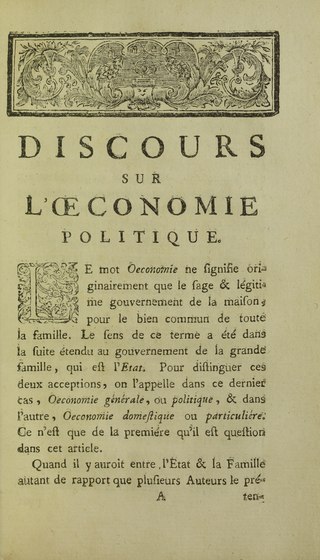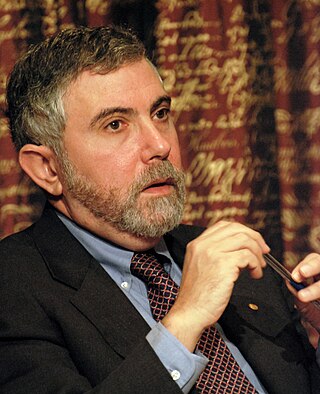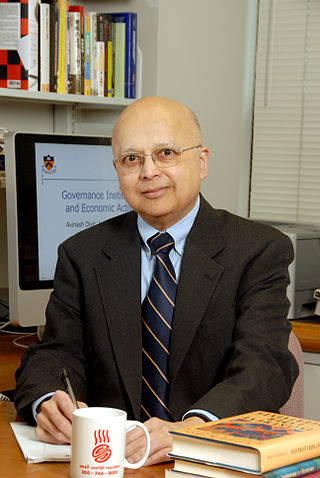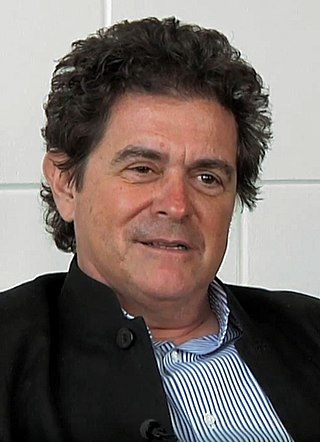Related Research Articles

Political economy is a branch of political science and economics studying economic systems and their governance by political systems. Widely studied phenomena within the discipline are systems such as labour markets and financial markets, as well as phenomena such as growth, distribution, inequality, and trade, and how these are shaped by institutions, laws, and government policy. Originating in the 16th century, it is the precursor to the modern discipline of economics. Political economy in its modern form is considered an interdisciplinary field, drawing on theory from both political science and modern economics.

A country's industrial policy (IP) or industrial strategy is its official strategic effort to encourage the development and growth of all or part of the economy, often focused on all or part of the manufacturing sector. The government takes measures "aimed at improving the competitiveness and capabilities of domestic firms and promoting structural transformation". A country's infrastructure is a major enabler of the wider economy and so often has a key role in IP.

Paul Robin Krugman is an American economist who is the Distinguished Professor of Economics at the Graduate Center of the City University of New York and a columnist for The New York Times. In 2008, Krugman was the winner of the Nobel Memorial Prize in Economic Sciences for his contributions to New Trade Theory and New Economic Geography. The Prize Committee cited Krugman's work explaining the patterns of international trade and the geographic distribution of economic activity, by examining the effects of economies of scale and of consumer preferences for diverse goods and services.
International political economy (IPE) is the study of how politics shapes the global economy and how the global economy shapes politics. A key focus in IPE is on the distributive consequences of global economic exchange. It has been described as the study of "the political battle between the winners and losers of global economic exchange."

Dani Rodrik is a Turkish economist and Ford Foundation Professor of International Political Economy at the John F. Kennedy School of Government at Harvard University. He was formerly the Albert O. Hirschman Professor of the Social Sciences at the Institute for Advanced Study in Princeton, New Jersey. He has published widely in the areas of international economics, economic development, and political economy. The question of what constitutes good economic policy and why some governments are more successful than others at adopting it is at the center of his research. His works include Economics Rules: The Rights and Wrongs of the Dismal Science and The Globalization Paradox: Democracy and the Future of the World Economy. He is also joint editor-in-chief of the academic journal Global Policy.
Information economics or the economics of information is the branch of microeconomics that studies how information and information systems affect an economy and economic decisions.
International economics is concerned with the effects upon economic activity from international differences in productive resources and consumer preferences and the international institutions that affect them. It seeks to explain the patterns and consequences of transactions and interactions between the inhabitants of different countries, including trade, investment and transaction.
New trade theory (NTT) is a collection of economic models in international trade theory which focuses on the role of increasing returns to scale and network effects, which were originally developed in the late 1970s and early 1980s. The main motivation for the development of NTT was that, contrary to what traditional trade models would suggest, the majority of the world trade takes place between countries that are similar in terms of development, structure, and factor endowments.

Heterodox economics is any economic thought or theory that contrasts with orthodox schools of economic thought, or that may be beyond neoclassical economics. These include institutional, evolutionary, feminist, social, post-Keynesian, ecological, Austrian, complexity, Marxian, socialist, and anarchist economics.

Avinash Kamalakar Dixit is an Indian-American economist. He is the John J. F. Sherrerd '52 University Professor of Economics Emeritus at Princeton University, and has been Distinguished Adjunct Professor of Economics at Lingnan University, senior research fellow at Nuffield College, Oxford and Sanjaya Lall Senior Visiting Research Fellow at Green Templeton College, Oxford.
Benjamin Jerry Cohen is the Louis G. Lancaster Professor of International Political Economy at the University of California, Santa Barbara. At UCSB, where he has been a member of the faculty since 1991, he teaches undergraduate and graduate courses on international political economy.

Alberto Francesco Alesina was an Italian political economist. Considered one of the most cited supporters of austerity policies in the 2000s, he wrote about economics and political science.
The New Palgrave Dictionary of Economics (2018), 3rd ed., is a twenty-volume reference work on economics published by Palgrave Macmillan. It contains around 3,000 entries, including many classic essays from the original Inglis Palgrave Dictionary, and a significant increase in new entries from the previous editions by the most prominent economists in the field, among them 36 winners of the Sveriges Riksbank Prize in Economic Sciences in Memory of Alfred Nobel. Articles are classified according to Journal of Economic Literature(JEL) classification codes.
Involuntary unemployment occurs when a person is unemployed despite being willing to work at the prevailing wage. It is distinguished from voluntary unemployment, where a person chooses not to work because their reservation wage is higher than the prevailing wage. In an economy with involuntary unemployment, there is a surplus of labor at the current real wage. This occurs when there is some force that prevents the real wage rate from decreasing to the real wage rate that would equilibrate supply and demand. Structural unemployment is also involuntary.
Public economics(or economics of the public sector) is the study of government policy through the lens of economic efficiency and equity. Public economics builds on the theory of welfare economics and is ultimately used as a tool to improve social welfare. Welfare can be defined in terms of well-being, prosperity, and overall state of being.
Colin Hay is Professor of Political Sciences at Sciences Po, Paris and Affiliate Professor of Political Analysis at the University of Sheffield, joint editor-in-chief of the journal Comparative European Politics. and Managing Editor of the journal New Political Economy.
The concertina model, sometimes referred to as the concertina rule or "concertina method", is an international trade liberalisation strategy, which consists of removing the highest tariffs first. Amiti traces this "idea back to Meade who concluded that the welfare gains will be larger if tariffs on those goods with the highest tariffs are reduced first. This result was formalized by a number of authors, including Bertrand and Vanek (1971) and Falvey (1988) for a small, open, perfectly competitive economy."
Sanjaya Lall was a development economist and Professor of Economics at the University of Oxford. Lall's research interests included the impact of foreign direct investment in developing countries, the economics of multi-national corporations, and the development of technological capability and industrial competitiveness in developing countries. One of the world's pre-eminent development economists, Lall was also one of the founding editors of the journal Oxford Development Studies and a senior economist at the World Bank.
Matthew Watson is a professor of political economy and international political economy (IPE) in University of Warwick's Department of Politics and International Studies. His work in the area of IPE has been published widely; he has solely authored three books, and had around thirty articles published in peer reviewed academic journals on a wide range of issues in political economy and IPE. His three books are Foundations of International Political Economy, Political Economy of International Capital Mobility, and Uneconomic Economics and the Crisis of the Model World. Between 2001 and 2007, Watson served as a member of the Steering Committee of the Standing Conference of Arts and Social Sciences.
New pragmatism – original paradigmatic and heterodox theory of economics created by Grzegorz W. Kolodko to address the contemporary civilizational challenges and economic system transformations. It is based on the imperative for a harmonious triply sustainable social and economic growth.
References
- ↑ Charles S. Mayer "In search of Stability: Explorations in Historical Political Economy", Cambridge University Press, Cambridge, 1987, pp.3–6.
- ↑ cf: David Baker, "The political economy of fascism: Myth or reality, or myth and reality?" New Political Economy, Volume 11, Issue 2 June 2006, pp.227–250.
- ↑ Richard Higgott and Matthew Watson (2008) "All at sea in a barbed wire canoe: Professor Cohen’s transatlantic voyage in IPE", Review of International Political Economy, 15 (1), 2008, 1-17.
- ↑ Gamble, Andrew (1996) "The New Political Economy", Political Studies, 43 (3): 516-530.
- ↑ Watson, Matthew (2005) Foundations of International Political Economy, Basingstoke: Palgrave Macmillan.
- ↑ Watson, Matthew (2007) The Political Economy of International Capital Mobility, Basingstoke: Palgrave Macmillan.
- ↑ Higgott, Richard and Payne, Anthony (2000) (eds.) The New Political Economy of Globalisation, Two Volumes, Aldershot: Edward Elgar.
- ↑ Robert E. Goodin, Philip Pettit, Thomas W. Pogge (eds), A Companion to Contemporary Political Philosophy, John Wiley & Sons, 2012, p. 167.
- ↑ Rodrik, Dani (1998) Has Globalization Gone Too Far?, Washington, DC: Institute for International Economics
- ↑ Krugman, Paul (1999) The Return of Depression Economics , London: Allen Lane.
- ↑ Stiglitz, Joseph (2002) Globalization and Its Discontents , London: Penguin.